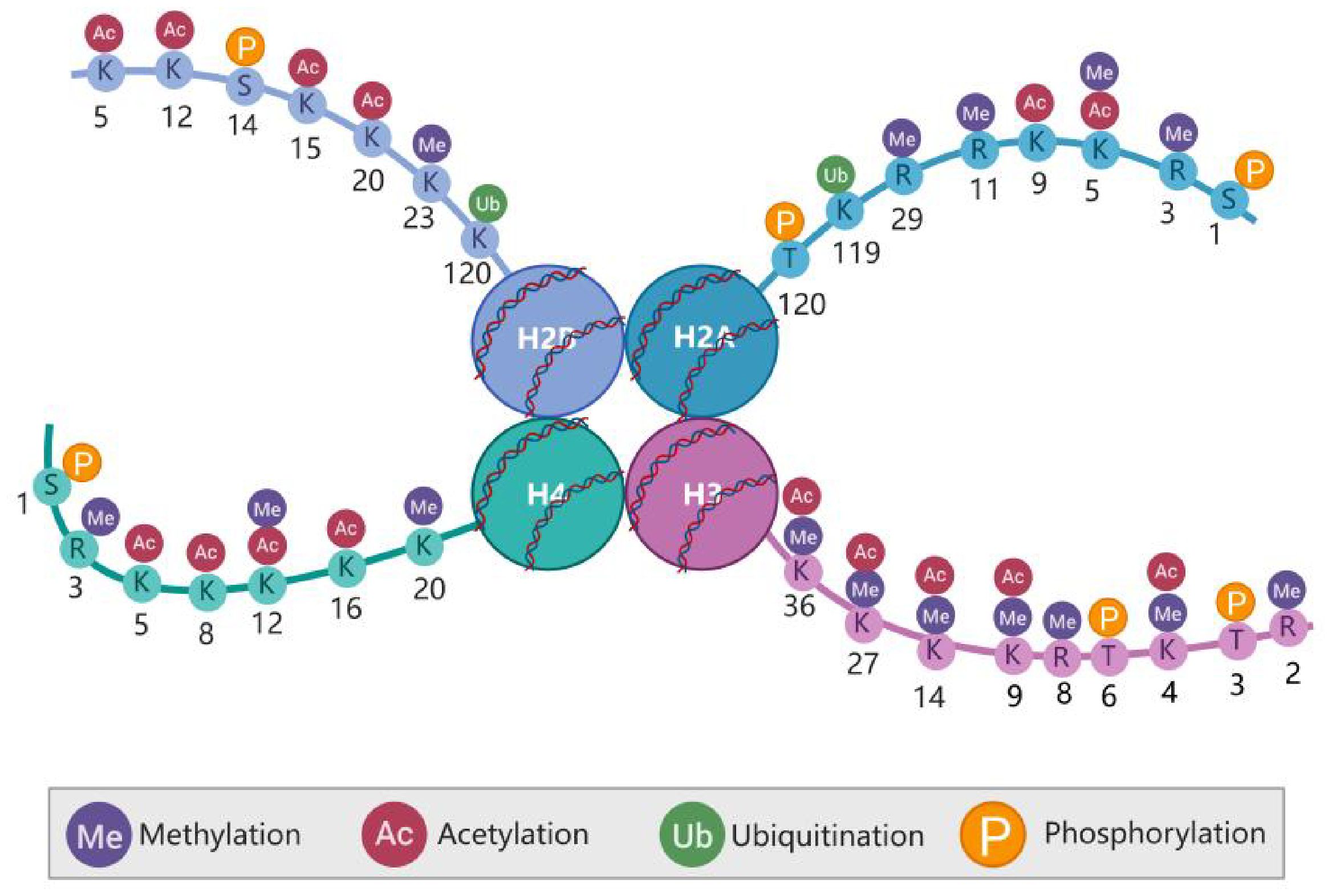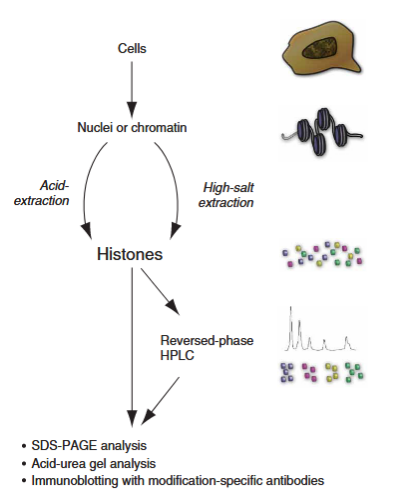Histone Isolation and Enrichment Service
Histones are core components of eukaryotic chromatin, comprising H2A, H2B, H3, H4, and linker histone H1. They play a central role in DNA packaging and the regulation of gene expression. The N-terminal tails of histones are rich in basic amino acids and serve as major hotspots for diverse post-translational modifications (PTMs), such as acetylation, methylation, and phosphorylation. These PTMs function synergistically to modulate chromatin architecture and transcriptional activity, and are involved in key biological processes including cell proliferation, differentiation, stress responses, and the pathogenesis of diseases such as cancer.

Duan, X. et al. Front. Immunol. 2024.
Figure 1. PTMs of the Histone Amino Terminus
To support comprehensive and accurate PTM profiling, high-resolution mass spectrometry (MS) has become the gold standard. However, it requires highly pure, low-background samples with intact modification states. MtoZ Biolabs offers a robust Histone Isolation and Enrichment Service, developed based on protocols published in Nature Protocols (2007), and optimized for a wide range of sample types including cultured cells, tissues, and primary cells. By integrating nuclear extraction, high-salt washing, acid-based histone release, TCA precipitation, RP-HPLC/HILIC purification, and multi-enzyme digestion strategies, Histone Isolation and Enrichment Service delivers MS-compatible samples tailored for downstream PTM analysis. Optional enrichment using IMAC or TiO₂ is available to further enhance detection depth and modification coverage.
Analysis Workflow
1. Cell Disruption and Nuclear Isolation
Mechanical homogenization or chemical lysis is used to release nuclei, followed by centrifugation to remove cytoplasmic proteins.
2. Chromatin Release and High-Salt Elution
Nuclei are disrupted to release chromatin, and histones are extracted with a high-salt buffer, eliminating DNA and nonspecific contaminants.
3. Acid Extraction with PTM Preservation
Core histones are extracted using 0.2 M H₂SO₄ in the presence of protease and phosphatase inhibitors to retain native PTM states.
4. TCA Precipitation and Ethanol Wash
Histones are precipitated using TCA, washed with chilled ethanol to remove impurities, and re-dissolved in a mass spectrometry-compatible buffer.
5. Subtype-Specific HPLC Purification (Optional)
RP-HPLC or HILIC can be applied for subtype separation when subtype-resolved or quantitative studies are required.
6. Multi-Enzyme Digestion and Peptide Enrichment
A combination of proteases (e.g., trypsin, Glu-C, Arg-C) ensures optimal peptide length and ionization, improving PTM identification. IMAC or TiO₂-based enrichment can be optionally performed.
7. Quality Control and Documentation
Each sample undergoes SDS-PAGE, protein quantification, and a preliminary MS scan to assess purity and digestion quality. Full QC documentation is provided.

Shechter, D. et al. Nature Protocols. 2007.
Figure 2. Workflow of Histone Extraction and Purification
Why Choose MtoZ Biolabs?
MtoZ Biolabs combines literature-proven methods with optimized lab workflows to ensure reproducible, MS-ready sample preparation:
✅ Protocol-Driven and Optimized for MS: Built upon Nature Protocols and adapted for current high-resolution MS platforms.
✅ Comprehensive PTM Preservation: Use of protease/phosphatase inhibitors throughout the workflow to maintain endogenous modification states.
✅ Advanced Digestion Strategy: Multi-enzyme digestion improves peptide diversity and PTM detection sensitivity.
✅ Compatible with Subtype Analysis and Enrichment: Optional histone subtype purification and PTM peptide enrichment meet a broad range of research needs.
✅ Wide Sample Compatibility: Applicable to cell lines, tissues, and primary cells for translational and basic research.
Sample Submission Suggestions
To ensure optimal results, please prepare the following:
· Cell Samples: ≥1×10⁷ cells without denaturants or high-salt pre-treatment
· Tissue Samples: ≥20 mg frozen tissue, transported under −80°C, light-protected, no freeze-thaw cycles
· Metadata: Species, treatment history, expected PTM types
For special sample types, please consult us in advance.
Applications
Histone Isolation and Enrichment Service supports a variety of research goals related to chromatin biology and histone PTMs:
· Global and quantitative profiling of histone PTMs
· Monitoring chromatin dynamics under drug treatment or epigenetic reprogramming
· Functional screening of histone-modifying enzymes and pathway analysis
· Standardized sample prep for ChIP-MS workflows
· Mechanistic studies of epigenetic dysregulation in cancer and immune diseases
What Could be Included in the Report?
1. Purified histone samples (reconstituted in MS buffer)
2. SDS-PAGE images, protein quantification data, and quality validation
3. Detailed enzyme digestion strategies, peptide coverage info, and PTM notes (if applicable)
4. Experimental records, operation logs, and key technical parameters
5. Optional: PTM-enriched peptide fractions and downstream recommendations
Histone Isolation and Enrichment Service by MtoZ Biolabs delivers reliable, low-background histone samples for high-sensitivity MS analysis and epigenetic research. Our standardized protocols and dedicated support team enable in-depth, reproducible results. Contact us for tailored technical guidance or custom project support.
Related Services
Histone PTM Identification Service
Histone PTM Data Analysis Service
How to order?







